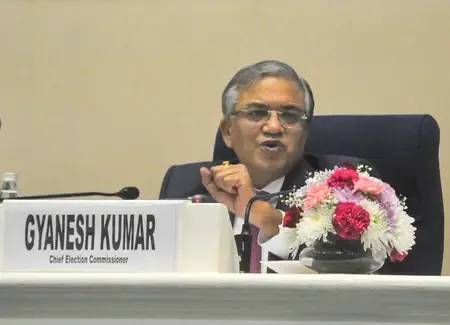Is the Scrapping of Registered Postal Services an Anti-People Policy?

Synopsis
Key Takeaways
- Discontinuation of Registered Post service affects millions.
- Speed Post is significantly more expensive than Registered Post.
- Low-income individuals and small businesses are disproportionately impacted.
- The decision is criticized for undermining social justice.
- Calls for restoration of services and reduction in costs are being made.
Chennai, Nov 6 (NationPress) In a pointed critique of the Central government's latest action, Tamil Nadu Congress Committee president K. Selvaperunthagai stated that the BJP-led administration's choice to eliminate the Indian Postal Department’s Registered Post service and force citizens to depend exclusively on Speed Post constitutes an “anti-people policy that takes advantage of the underprivileged and diminishes social justice”.
In a message broadcast on the social media platform X, Selvaperunthagai emphasized that the Indian Postal Department serves as a crucial institution delivering indispensable communication services to millions nationwide.
“It stands as one of the rare departments directly catering to the public and had even generated a profit exceeding Rs 2,300 crore in the previous financial year,” he noted.
“However, driven by a singular goal of boosting revenue, the Union BJP government has now eliminated the Registered Post service, coercing people into utilizing the more expensive Speed Post. This decision forces the underprivileged, students, job seekers, lawyers, and government offices to incur nearly double the previous cost for sending letters, applications, and certificates,” he asserted.
Selvaperunthagai pointed out that despite minimal differences in delivery times between Registered Post and Speed Post, the price disparity is significant. “The previous cost for Registered Post was around Rs 45, while Speed Post now costs Rs 85. Additionally, the fee for acknowledgment cards has surged from Rs 3 to Rs 11, compounded by an extra 18 percent GST on these services,” he added.
He labeled this decision as a direct attack on India’s communication rights, warning that it would adversely affect literacy advancement, educational institutions, and small businesses that rely on affordable postal services.
“The postal service is a fundamental communication channel for ordinary people. The discontinuation of the Registered Post service represents not just a financial burden but also economic exploitation of India’s impoverished population,” the TNCC chief remarked.
Selvaperunthagai called on the Union government and the Postal Department to immediately reverse their decision, reinstate the Registered Post service, and lower Speed Post charges. “On behalf of the Tamil Nadu Congress Committee, I vehemently condemn this unfair decision targeting the poor and working classes,” he concluded.









